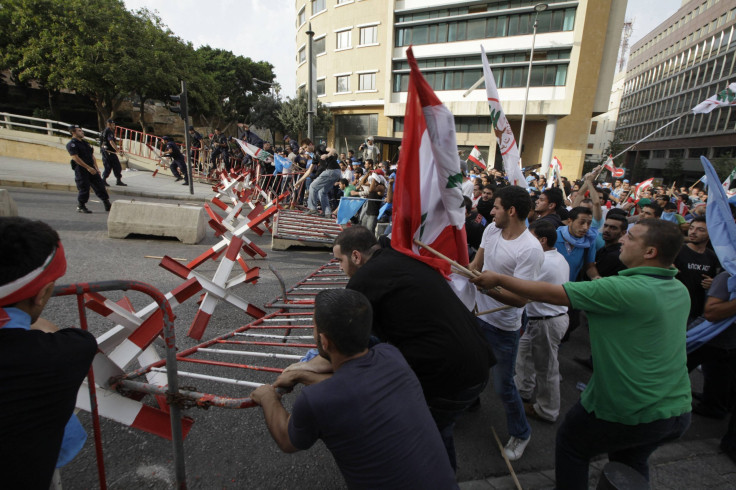Gunfire Follows General's Funeral In Beirut

Heavy gunfire erupted in central Beirut Sunday after protesters tried to storm the offices of Prime Minister Najib Mikati, demanding that he quit over the assassination of a top intelligence official, Reuters reported.
Protesters also threw stones at the building as police fired tear gas, the BBC reported.
Security forces shot into the air and police fired tear gas to repulse the hundreds of protesters who overturned barriers and threw stones and steel rods, witnesses told Reuters. They scattered after the security forces' action, and there were no immediate reports of any casualties other than two people fainting.
The clashes came after thousands of Lebanese mourned Brig. Gen. Wissam al-Hassan at his funeral as heavily armed troops and police stood guard around Martyrs' Square in central Beirut.
Many waved the sky-blue flag of the Sunni-based opposition Future Party, Reuters reported. Others carried Lebanon's cedar tree national flag, but Syrian rebel flags and black Islamist banners were also seen. The Assad regime in Syria is widely accused of the assassination.
Banners read "Go, go Najib" and "The people want the overthrow of Najib," echoing the slogans of the Arab Spring.
Hassan, 47, was killed by a powerful car bomb in Beirut's Ashrafiyeh district on Friday. A Sunni Muslim close to the Hariri political clan, he had helped uncover a bomb plot that led to the arrest and indictment in August of a pro-Damascus former Lebanese minister.
He also led an investigation that implicated Syria and its Lebanese ally Hezbollah in the assassination of former Prime Minister Rafik al-Hariri, a Sunni, in 2005.
Lebanese politicians have accused Syria's leadership of having a role in Hassan's killing, which deepened fears the civil war there is spreading across its borders.
Lebanon's Shia militant group Hezbollah -- a close ally of the Syrian government -- condemned the bombing, the BBC reported, and Syrian Information Minister Omran al-Zoubi called it a "cowardly, terrorist act."
Senior politicians and military and security leadership turned out at the Internal Security Force headquarters for the start of the funeral, held with full military honors and broadcast live on national television.
Giant posters of Hassan could be seen around the city, calling him a “martyr of sovereignty and independence,” the Associated Press reported.
Hassan's wife and two sons, the youngest weeping, listened as he was eulogized by the head of the police, Ashraf Rifi, and President Michel Suleiman.
Suleiman said the government and people must work "shoulder to shoulder" to overcome the challenges posed by the killing.
"I tell the judiciary do not hesitate, the people are with you, and I tell the security be firm, the people are with you, with you. And I tell the politicians and the government do not provide cover to the perpetrator."
People at Martyrs' Square said they saw Syria's hand in the bombing.
"We blame Bashar al-Assad, the president of Syria," said Assmaa Diab, 14, from the northern Lebanese city of Tripoli, Hassan's hometown. "He is responsible for everything -- in the past, now, and if we don't stand up to him, the future."
The prime minister was also a focus of their anger. Protesters said they wanted him to step down, saying he was too close to Hezbollah, which is part of his government, and to Assad.
"We are here to tell Mikati we don't need him any more and to tell Hezbollah we don't want any more of their games," said Hamza Akhrass, a 22-year-old student who had come from South Lebanon for the funeral. "Mikati takes too much pressure for Syria."
Former Prime Minister Saad Hariri, the slain prime minister's son, had urged "all of Lebanon, which Wissam al-Hassan protected from the plots of Bashar al-Assad," to attend the funeral.
Mikati said on Saturday he had offered to resign to make way for a government of national unity, but he had accepted a request by Suleiman to stay in office to allow time for talks on a way out of the political crisis.
Mikati is a Sunni, but many fellow Sunnis see him as unwilling to stand up to Hezbollah, the militant Shi’a movement that dominates the government and supports Assad’s brutal fight against a 19-month effort to oust him. The deaths of thousands of Sunnis in that crackdown have increasingly enraged Sunnis in Lebanon.
© Copyright IBTimes 2024. All rights reserved.





















